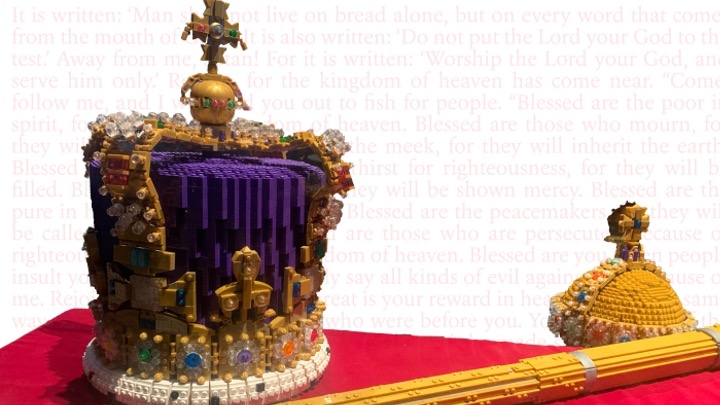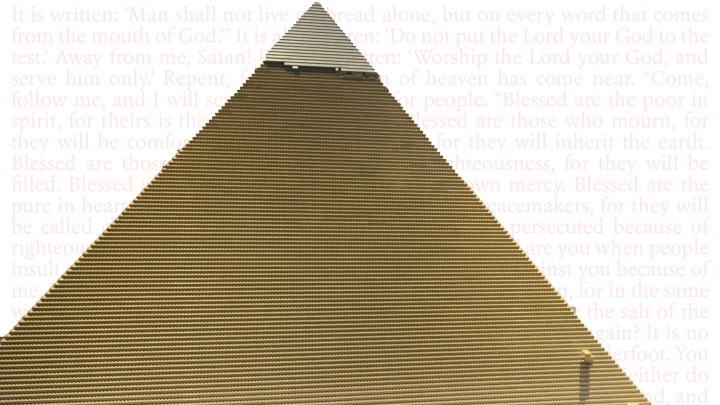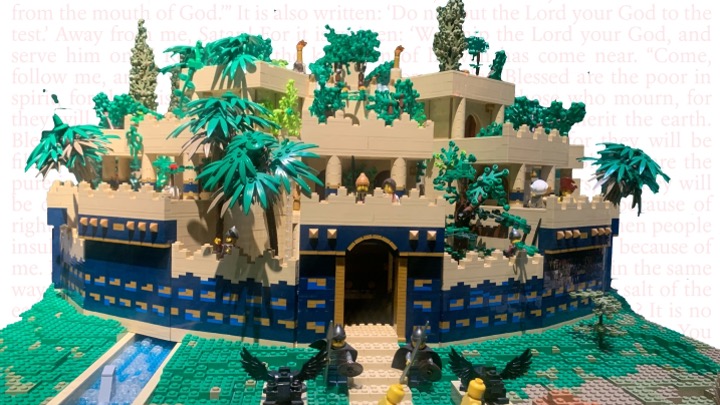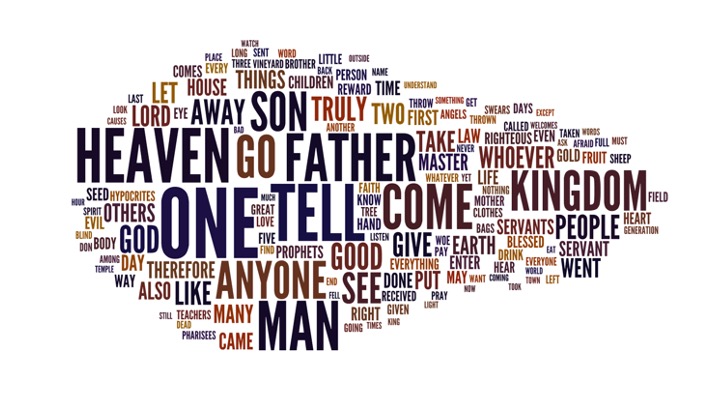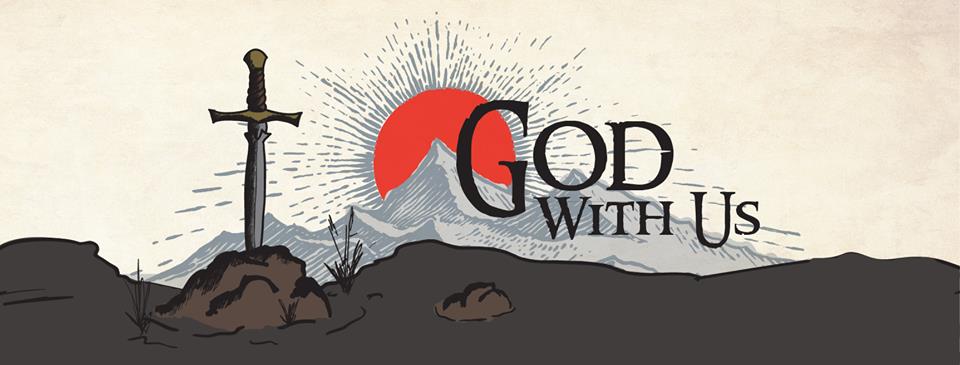This is an edited transcript of a sermon on Matthew’s Gospel from City South Presbyterian Church in 2022. You can listen to the sermon here, or watch here. The running time for those options is 35 minutes.
If you were given the ability to cut out anything in the modern world to fix it, where would you be pointing your blade?
What political issue or system would you tackle to bring about righteousness?
Maybe, this week, you are feeling like it is religious freedom? Maybe it is modern economics?
What would you cut down that gets in the way of heaven on earth? Jesus has been talking about the kingdom of heaven at every turn (see Matthew 3:2), and he keeps going in this passage today. Jesus is still speaking on the mountain (Matthew 5:1-2), as the new Moses.
Moses would meet God on the mountain (Exodus 19:3, 24:18, 34:4). Mountains are a meeting place between heaven and earth. Mountains are places where God’s people would meet with God (like Jerusalem would become with the Temple) and then take God’s kingdom down to earth. When Moses did this, over time, he was transformed by being in God’s presence, till he began shining with God’s glory (Exodus 34:29).
And now Jesus describes a restored Jerusalem — a whole city of shining Moseses — people who are the light of the world (Matthew 5:14-15), whose light shines, visibly — so people see our good deeds, they get a glimpse of heaven and of God and instead of glorifying us for our goodness — they see God in us and with us — and glorify Him (Matthew 5:16). He’s come to create a kingdom of Moseses.
One way to think about “glorifying” is the idea of “shining the light on” — our good deeds do this because we are carrying the light of heaven — radiating God’s character, imaging Him. This is a little picture of the kingdom of heaven; this shining people. Jesus keeps using this phrase the kingdom of heaven (Matthew 5:19, 20). It’s what Israel is waiting for. Jesus says he has not come to get rid of the old, not to replace Moses, or the Old Testament law — or to get rid of the prophets — but to fulfill them (Matthew 5:17); fulfilling their hopes for a Kingdom.
Now, we might file these bits of the Bible — law, and prophets — separately, but Jesus groups them together and says both have a purpose or a telos — or something, or someone they are pointing to — and he is it.
What follows is one of the most intense bits of Jesus’ teaching — it looks like he takes the law and makes it harder to obey — or some people think it is to teach us how impossible the law was to keep, so we rely on grace alone — and it is true only one person has fulfilled the law perfectly… and that he offers us forgiveness for where we fall short, by grace, through faith.
Jesus says those people who want to set aside these commands will be called least in the kingdom, while those who practice them and teach them will be called great in the kingdom of heaven (Matthew 5:19).
Jesus is not changing the law. He is showing how the law has been misunderstood — to show people are not pursuing righteousness, because they are not pursuing God. They are not a bunch of rules with nothing to do with being the kingdom of heaven — the city on a mountain — They are not an impossible standard to ignore. They are a way of life we are invited to practice in the freedom that comes from being God’s children; those liberated to join Him in His kingdom.
Sometimes in our rush to reduce the gospel to the good news about how we are saved by Jesus — “justification,” we miss that the gospels — like Matthew — are a story that is also about what we are saved for, “sanctification,” how we are called to become like Jesus as we imitate him. This idea that we should teach these commands — and obey them — comes up again in the Great Commission — we are not just told ‘make converts by preaching the Gospel’ — we are told to take people through a new exodus — baptism — and to make disciples who will obey these commands (Matthew 28:18-20).
Back on the mountain Jesus drops this bomb. He says the kingdom of heaven requires a righteousness that surpasses the Pharisees (Matthew 5:20).
He is playing with the expectations first century Israelites have about the kingdom. The Pharisees believed God would not send a Messiah to end the exile until Israel was cleansed. There is a document from the late first century BC called the Psalms of Solomon, reflecting their thinking about Israel’s restoration and the end of Roman rule. For this to happen God had to cleanse Israel before this day of mercy and blessing when he would bring back his anointed:
“Behold, O Lord, and raise up unto them their king, the son of David. At the time in the which thou seest, O God, that he may reign over Israel, thy servant. And gird him with strength that he may shatter unrighteous rulers.”
“And that he may purge Jerusalem from nations that trample her down to destruction. Wisely, righteously he shall thrust out sinners from the inheritance.”
“And he shall not suffer unrighteousness to lodge any more in their midst, nor shall there dwell with them any man that knoweth wickedness, for he shall know them, that they are all sons of their God.”
For this to happen, Israel would have to cut out their unrighteousness. The wicked would be removed and only children of God would remain — there would be no more enemies. No Romans.
This idea of righteousness meant the Pharisees created a bunch of extra laws going beyond the Old Testament — to create a righteous Israel, so the Messiah would come. There were other groups too.
The Zealots; they hated the Romans, and some of them even started assassinating them in the streets using a special sort of knife called a Sicarii. They wanted to bring the kingdom by literally cutting out God’s enemies.
The Essenes, who cut themselves off from those they saw to be a corrupt Israel — waiting for God’s king to lead them home. The Dead Sea Scrolls found in a place called Qumran — were probably from the Essenes. They were waiting for a priest-king who would bring a shining, glorious, kingdom. Here is an excerpt from one of the scrolls (4Q541). This Messiah would speak words from the heavens, bringing a shining light that triumphed over darkness:
“His utterance is like the utterance of the heavens, and his teaching is according to the will of God. His eternal sun will shine, and his fire will burn in all the ends of the earth, and over the darkness it will shine.”
And the Sadducees were wealthy rulers who ran the priesthood in Jerusalem. They were pretty legalistic, and it seems they majored on the Torah — the Old Testament law. They were prepared to cut out sin, literally. There is an ancient source that talks about a book of decrees they had with guides for how to literally apply the “an eye for an eye, a hand for hand” law from the Torah (Exodus 21:23-25). Other groups had tried to put a money value on restoration, the Sadducees wanted to get the knives out.
All these communities came with different pictures of what a Messiah — the promised king — would be like; how he would wield the blade; and who would get cut. When Jesus says he is fulfilling the Old Testament, all these groups have different ideas (Matthew 5:17). Jesus starts unpacking where they have got it wrong. He repeats this little pattern six times in the chapter — “you have heard…” “but I tell you” (Matthew 5:21-22, 27-28, 31-32, 33-34, 38-39, 43-44).
And the stakes on getting the kingdom right are high — not just about the political future of Israel, but cosmic questions of heaven or hell (Matthew 5:19, 20, 22). There is even what we might call cosmic geography built into some of the commands — do not swear by heaven — God’s throne — the earth — his footstool — or Jerusalem — the mountain city of God’s Messiah — when he talks about oaths, there are kingdom categories we do not typically have in mind when swearing an oath with our hand on a Bible (Matthew 5:34-35). And then Jesus goes into some examples to reveal the heart of the law — the way God’s people were always meant to understand it. Starting with anger (Matthew 5:44-45).
Righteousness is not just about actions, but about the heart — the inner person — Jesus is not coming to cut away at people’s actions, or different political groups — he is coming to cut hearts.
We can be like the Pharisees, thinking about righteousness in terms of controlling our actions, making rules or systems to stop ourselves sinning — and self-control is great — but the kingdom does not need new rules to shape your behaviour, new systems in place — it needs new hearts.
It feels odd to need to point it out — but harboring anger in your heart is absolutely less sinful than murdering them. He is not saying ‘if I am angry I may as well do more.’ Jesus is not equating the two — there is a whole heap of intersecting sins caught up in the murder of a person involving the theft of a life — a person who belongs to God and others — that means both the consequence and the offence is greater — that is not actually Jesus’ point.
Jesus is revealing that the law was always about the heart; not about being righteous through actions, but becoming righteous through the pursuit of God.
Think of it like a house — the “do not murder” a law — is the floor of the house. When you cross that barrier you are not part of the house. You are unrighteous. But walking around not murdering people is not the same as righteousness. It is the floor when it comes to writing a law, but God’s law was not just written to define the floor. In the law, and the story the law is embedded in, in the Torah, we are meant to meet the righteous and loving God behind the law — and to become like Him.
That is the ceiling.
Jesus is not changing the rules as much as saying that by looking at the floor, and making sure you do not fall through it, you have missed the ceiling.
And maybe anger is an area where you are happily not violating the floor — not murdering — maybe even putting up laws or strategies that stop you getting angry — but how are you going at loving people, rather than being angry at them.
It is the same with lust (Matthew 5:28) — adultery is much more costly than lusting after someone in your heart — but lust is already a failure to love. We are already missing the principle at the heart of the law about being like God and seeing other people like God does; we are already slipping into seeing people the way Satan wants us to see people.
God’s law is actually — and has always actually — been about hearts that are devoted to God, that produce lives that look like God, that reflect and bring glory to Him. That is the righteousness the law requires — that we actually be image bearers of God.
And this stuff is serious — it is worth cutting out. Jesus even says we should be prepared to take the knife to ourselves (Matthew 5:29-30).
Now — there have been people in history who have taken this idea of cutting off body parts that lead to sin quite literally with drastic consequences — and maybe they would be appropriate if our eyes or our hands actually caused us to sin…
But we know they do not. Do not we?
In fact, Jesus is going to say that all this stuff — anger — lust — the stuff we might blame our hands and our eyes for — murder, adultery — and other sins — comes from the heart (Matthew 15:19-20).
It is our hearts that need to go under the knife.
Blessed are the pure in heart.
The Pharisees wanted to change Israel — to produce righteousness —through new laws governing behaviours, but they missed the heart… The Zealots thought the problem to be cut out was other people — fix the system and righteousness would flourish… Get rid of the Romans…
And the Sadducees — they would chop bits of sinners to produce righteousness rather than their own bits… Jesus upends their expectations too… In case the crowd watching on has not got the point Jesus goes straight for the bit in the law the Sadducees loved (Matthew 5:38-39).
And maybe the idea driving the Zealots in their pursuit of justice through violence — and he says do not — and even — do not resist.
Overcome evil with good. If they slap you on the right cheek, turn the other one…
Now again, this is the teaching of principles — It is not actually a good idea in a whole bunch of situations to let people punch you or hit you — the point is to not retaliate with retribution, or even with justice, but with love and mercy. Taking the cost of making peace upon yourself — And, if someone wants to sue you for your shirt, give them your coat, and go the extra mile when someone is forcing you on a journey (Matthew 5:40-41).
You sense the Zealots going cold here.
The Messiah has not come to destroy Israel’s enemies — but to love them (Matthew 5:43-44).
He has not come to chop up sinners or stab Romans. He has not come leading a rebellion with swords and spears, but to lead people — even Gentiles — even the Romans, back to God.
The Pharisees might have thought Israel needed to be cleansed of wickedness — of enemies — in order for the children of God to be revealed (Psalms of Solomon). Jesus teaches that it is those who love their enemies — those who persecute us — who will be children of God (Matthew 5:44-45). And then, here is where Jesus reveals what the law was always about — the ceiling — Jesus says the task here is to be perfect as our heavenly Father is perfect (Matthew 5:48).
Or as Leviticus puts it — be holy, because God is holy (Leviticus 20:26). It is this reflecting the nature of God that was meant to set Israel apart as God’s kingdom.
There was never a way we could hit the ceiling. The law was designed to produce godliness, by driving people towards God; depending on His grace and mercy and forgiveness. Moses became shinier the more he went back to God after Israel sinned, after he had failed, trusting in the goodness of God.
Jesus fulfills the law and the prophets (Matthew 5:17) by bringing heaven and earth together — mediating between us and God, and speaking for God, the way Moses and the prophets did.
He fulfills the law by more than just keeping the law — even being perfectly holy and like God — he fulfills the law in the same way he fulfills the prophets.
He is the one the law points to — the sacrificial system, our need for God to save, the Exodus story and the idea of a kingdom of image bearing priests who would fill the earth with God’s presence.
He even fulfills the idea that the knife needed to be turned on our own hearts. Moses promised a return from exile would happen when God changed hearts — circumcised — cut them — so we might actually love God, and in loving God, find life (Deuteronomy 30:6-7). We will see Jesus pick up this language in Matthew. Then the idea of new hearts and a new covenant was picked up by the prophet Jeremiah (Jeremiah 31:33).
Who said God’s law was going to be written on his people’s hearts — recreating a people, a kingdom, for himself — which is what Jesus comes to do, as he brings heaven and earth together by baptizing with the Holy Spirit and bringing the kingdom of heaven. Showing us it is our hearts that need cutting first — not others. Ultimately the Pharisees and Sadducees will throw their lot in with Rome — staging an insurrection against God’s king. Coming with swords to arrest him and turn him over to the Romans.
And they do this at the exact the moment the Zealots have their own insurrection — an uprising — against Rome going on in Jerusalem — that is what Barabbas, the guy whose place Jesus takes, and the thieves crucified next to him were guilty of —
And as Israel reveals what it thinks the kingdom of heaven is going to look like,
Jesus is revealing God’s kingdom. In his death and resurrection we see the heart of God, as Jesus fulfills the law and the prophets —
You want to know how the law is fulfilled, or the prophets, look at Jesus.
You want to know what the kingdom of heaven looks like, and what righteousness looks like, and what God requires in an image bearing person who radiates his glory, look at Jesus. Crucified.
This is where we see him as the one who fulfills the Sermon on the Mount — loving his enemies, praying for those who persecute him, turning the other cheek.
He does not cut up the enemies of God, but has his own skin pierced, to love his enemies and make us God’s children — bringing those who receive him as king and savior into his kingdom.
Jesus comes to show us that the problem with the world is not out there — it is not just the Roman Empire and Satan pulling the strings. It is in us. It is our hearts. He brings forgiveness of sins — cleansing — and new hearts; fulfilling the Law (Deuteronomy 30), and the Prophets (Jeremiah 31).
Whatever bringing the kingdom looks like, it is not fixing some out there thing first, but having the knife applied to our hearts, having God’s law written on our hearts, so that we pursue the God we meet in Jesus and are transformed to become his shining children, the light of the world; a heavenly city of shining ones, whose transformed lives, and utter dependence on God to save — will glorify God (Matthew 5:14-16).
Right at the end, as Jesus sends his disciples into the world — people who follow and walk with the king — he takes them up a mountain (Matthew 28:16), and sends them — and those who came after them — into the world teaching one another to obey his commands; as shining ones (Matthew 28:19-20).
When we think about how we would fix the world, we can operate like Pharisees or Zealots or Sadducees. We can be keen to reach for the knife, to take out our enemies, or cut off bits of people who have wronged us, to do our bit to create laws that will fix things; fighting some culture war, and so forgetting about the real battle, as Jesus frames it; to live lives from hearts that have been cut by God so that we obey him.
Are you prepared to make the cuts to your own heart?
To live as shining people who practice and teach the commands of Jesus, not because they save us, but because we are saved to live this way as those whose lives reflect the glory of our God and his king.
Imagine what we would look like if we practiced these commands from the Sermon on the Mount; not perfected them, but just making them practices that drive us to the heart of God (Matthew 5:44-45).
Imagine if we worked hard at being peacemakers when we have conflict with our brothers and sisters in Christ — as a training ground for how we love our enemies.
Imagine what it would look like if the church had a reputation not only for sexual purity — which we often do not — but for being a place where we do not objectify and lust not only after those in our communities — our brothers and sisters — but those outside.
Imagine if we took Jesus’ words seriously on porn, or our thought worlds, and worked harder to cut out that habit? Not chopping your hand off when it causes you to sin, or gouging out your eyes but having God change your heart, so you see those men and women as those made in the image of God who are meant to reveal his glory, but more, so that you hunger and thirst for righteousness; for God.
Imagine if we cared about our own hearts, and bringing them into alignment with the heart of God, more than the actions of others.
Imagine if we were not known for using courts or legislation to protect our rights and police the righteousness of others, but for being generous, including to those persecuting us.
Imagine, for a moment, one of the more popular scenarios in the culture wars — a Christian baker being forced to make a cake for a gay wedding cake at the threat of legal action… Whether being asked genuinely, or as part of the culture war being fought by others.
Imagine if that baker instead of doubling down and refusing to give his shirt, made two cakes, or catered for the wedding.
Imagine if we took these words of Jesus seriously, rather than putting them in the too hard basket.
Obeying them will look different for different people in different contexts — these are little stories that are not likely to happen to you tomorrow, but the principle is what we are trying to figure out. Those are the sorts of good deeds that shining people might do as we reflect a little bit of heaven on earth.

